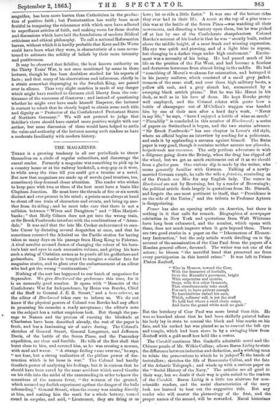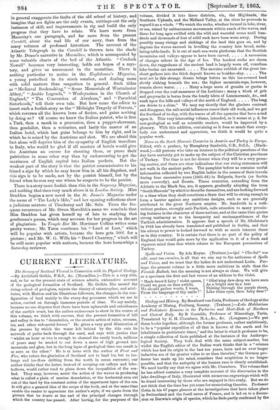THE MAGAZINES.
THERE is a growing tendency in all our periodicals to throw themselves on a circle of regular subscribers, and discourage the casual reader. Formerly a magazine was something to pick up in a country house or at the railway bookstall, a stop-gap as it were, to while away the time till you could get a treatise or a novel. But now that magazines are made up of novels (and treatises, too, sometimes) they demand closer attention. The reader who wishes to keep pace with two or three of the best must have a brain like Clapham Junction. He must have the threads of five or six novels distinct and ever present in his mind ; a points-man always at hand to shunt off one train of characters and events, and bring up ano- ther from its siding ; and he must take care that there is not a collision between "Wives and Daughters" and "Miss Marjori- banks ; " that Molly Gibson does not get into the wrong train, or Sir Brook Fossbrooke interfere with the combinations of "Arms- dale." It was said that the late Mr. Croker endeavoured to emu- late Creaar by dictating several despatches at once, and that he sometimes censured the Admiral on the Pacific station for having taken so many days on his passage from Hong Kong to Palermo. A rival novelist accused James of changing the colour of his hero- ine's hair and eyes in each successive volume, and giving his hero such a string of Christian names as to puzzle all his godfathers and godmothers. The reader is tempted to imagine a similar fate for magazine stories, and to gloat over the embarrassment of an editor who had got the wrong "continuations."
Nothing of the sort has happened to our batch of magazines for September. We give Blackwood the preference this time, for it is an unusually good number. It opens with "Memoirs of the Confederate War for Independence, by Heros von Borcke, Chief of the Staff to General J. E. B. Stuart," and a beau sabreur, as the editor of Blackwood takes care to inform us. We do not know if the physical powers of Colonel von Borcke had any effect in procuring his memoirs a ready acceptance ; the editor's note on the subject has a rather suspicious look. But though the pas- sage to Nassau and the process of running the blockade at Charleston have been described already, the rest of the paper is fresh, and has a fascinating air of naive daring. The Colonel's sketches of General Stuart, General Long,street, and Jefferson Davis, of the battle of the Seven Pines, and the Pamunkey expedition, are clear and forcible. He tells of the first shell that burst close to him, and covered him, as ha was crossing a morass, with mud and water. "-A strange feeling came over me," he says, 4' not fear, but a strong realization of the pitiless power of des- truction which is let loose in war." The Colonel had hardly Goethe's power of analyzing his feelings, but it is curious that he should have been saved by the same accident which saved Goethe on his ride into the midst of the cannonading in order to know the sensations of the cannon fever, "the wetness of the ground, which secured my foolish experiment against the danger of the balls rebounding." General Stuart, when the enemy was aiming directly at him, and making him the mark for a whole battery, turned round in surprise, and said, "Lieutenant, they are firing at us
here ; let us ride a little faster." It was one of the hottest rides they ever had in their lif. s. A scout at the top of a pine tree— this was at the battle of the Seven Pines—was watching all their movements, and directing a battery upon them, but he was picked off at last by one of the Confederate sharpshooters. Colonel Borcke's account of his leader is that he was "stoutly built, rather above the middle height, of a most frank and winning expression. His eye was quick and piercing, and of a light blue in repose, but changing to a darker tinge under high excitement." Excite- ment was a necessity of his being. He had passed much of his life on the prairies of the Far West, and had become a fearless and dexterous horseman from almost living in the saddle. He had "something of Murat's weakness for ostentation, and betrayed it in his jaunty uniform, which consisted of a small grey jacket. trousers of the same stuff, and over them high military boots, a yellow silk sash, and a grey slouch hat, surmounted by a sweeping black ostrich plume." But he was like Murat in his dash, as well as in his love of dress. He kept Borcke pretty well employed, and the Colonel relates with gusto how a bottle of champagne out of Af'Clellan's waggon was handed him by one of their men after a hard day's work. "Never in my life," he says, "have I enjoyed a bottle of wine so much.' " Piccadilly " is concluded in this number of Blackwood; a series of papers on Switzerland is begun, and the two stories advance. "Sir Brook Fossbrooke " has one chapter in Lever's old style, where an official begins an interview by sending for a policeman, and ends it by applauding a sarcasm against himself. The Swiss paper is very good, though it contains neither ascents nor glissades, bergschrunds nor crevasses. The only perilous adventure is with a diligence going down the Briinig, when the drag has slipped off the wheel, but we get as much excitement out of it as we should from a glacier pass. One curious slip is made by the writer, who seems generally familiar with German. Talking of a newly- married German couple, he calls the wife a fraulein, reminding us of the French use Miss for any English lady. The verses in Blackwood are not by Browning, but by a reader of Browning's; the political article deals largely in quotations from Mr. Disraeli, and forgets the one most pertinent to itself, that "Providence is on the side of the Tories ;" and the tribute to Professor Aytoun is disappointing.
Fraser has also an opening article on America, but there is nothing in it that calls for remark. Biographies of newspaper celebrities in New York and quotations from Walt Whitman have long been exhausted, and the number, which opens with these, does not much improve when it gets beyond them. There are two good stories in a paper on the "Irksomeness of Elemen- tary Instruction," but the only article worth dwelling on is dip account of the assassination of the Czar Paul from the papers Of" a Russian general officer, deceased. The writer was not one of the actors ; he blesses "the merciful hand that preserved me from every participation in this horrid crime." It was left to Prince Piston Zouboff,
"Who in Moscow, toward the Czar, With the demurest of footfalls, Over the Kremlin's pavement, bright With serpentine and syenite, Steps, with five othor Generals, That simultaneously take snuff, For each to have pretext enough To kerchief wise unfurl his sash, Which, softness' self, is yet the stuff To hold fast where a steel chain snaps And leave the grand white neck no gash."
But the butchery of Czar Paul was more brutal than this. He was so knocked about that he had been skilfully painted before his body lay in state to conceal the black and blue marks on his face, and his cocked hat was placed so as to conceal the left eye and temple, which had been stove in by a swinging blow from Zouboff with a gold snuff-box held like a cestus.
The Cornhill continues Mrs. Gaskell's admirable novel and the - Chinese puzzle of Mr. Wilkie Collins ; allows Baron Liebig to state the difference between induction and deduction, and a vibrking man to relate the persecutions to which he is :subjectitt the hands of teetotallers ; sketches the life of Benvenuto Cellini, and the fate of the Atlantic Telegraph ; and winds up with a curious paper on the "Social History of the Navy." The articles are all good in their way, but we doubt if their way is quite suited to the readers of the Cornhill. Baron Liebig is a little too abstruse for non- scientific readers, and the social characteristics of the navy look too learned to bear out the suggestive title. But any reader who will master the phraseology of the first, and the proper names of the second, will be rewarded. Naval historians in general exaggerate the faults of the old school of history, and
imagine that sea fights are the only events, cuttings-out the only instances of skill, and improvements in rig and build the only progress that they have to relate. We learn more from Macaulay's one paragraph, and far more from the present Cornhill, about the real life of our navy, than from the many volumes of professed historians. The account of the Atlantic Telegraph in the Cornhill is thrown into the shade by Mr. Deane's narrative in Macmillan, which is accompanied by some valuable charts of the bed of the Atlantic. " Cradock
Nowell" become; very interesting, holds out hopes of a mys- tery, and gives us amusement in the- meantime. There is nothing particular to notice in the Englishman's Magazine, a young periodical in its ninth number, and dealing more with solid matters than magazines in general. Such titles as " Mediteval Bookmaking," "Some Memorials of Westminster Abbey," "Arabic Legends," " Wesleyanism in the Church of England," "The Conversion of Abraham," and "Parochial Sisterhoods," tell their own tale. But how came the editor to insert such a foolish story as the "Midnight Tragedy of Ferrara," which reverses all the known laws of fiction, and gains nothing by doing so ? Of course we know the Italian patriot, who is first a Turk, then a monk in a procession, then a puppet-showman, then gondolier, then a vetturino, and lastly the master of an Italian hotel, which last guise belongs to him by right, and in which he is seized by the Austrians and shot. We are afraid this fact alone will deprive him of the sympathy of English travellers in Italy, who would be glad if all masters of hotels would give the Austrians an excuse for shooting them, or prove their patriotism in some other way than by endeavouring to get the maximum of English capital into Italian pockets. But the weakest part of the story is that the patriot communicates to his friend a sign by which he may know him in all his disguises, and this sign is to be made, not by the patriot himself, but by the friend when he sees any one whom he suspects to be the patriot.
There is a story more foolish than this in the Sixpenny Magazine, and nothing that rises very much above it in London Society. Miss Braddon begins a new novel in the St. James's Magazine under the name of "The Lady's Mile," and her opening reflections show a judicious mixture of Thackeray and Mr. Sala. From the fre- quent recurrence of Mr. Owen Meredith's name we conclude that Miss Braddon has given herself up of late to studying that gentleman's poems, which may account for her progress in the art of plagiarism. In Temple Bar Mr. Mortimer Collins writes some pretty verses ; Mr. Yates continues his "Land at Last," which will be popular with artists, because the hero gets 500/. for a picture ; and Mr. W. G. Wills his "David Chantrey," which will be still more popular with authors, because the hero horsewhips a Saturday reviewer.































 Previous page
Previous page